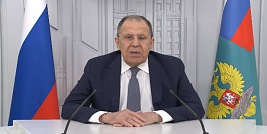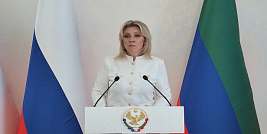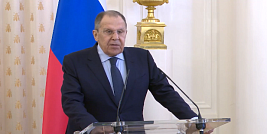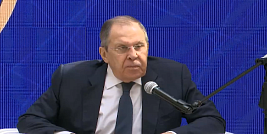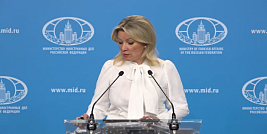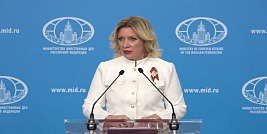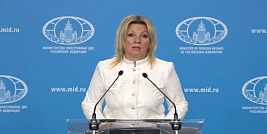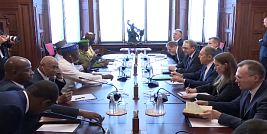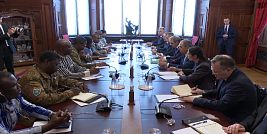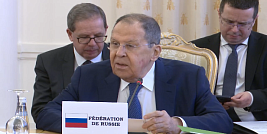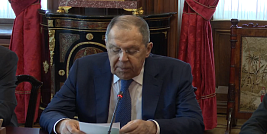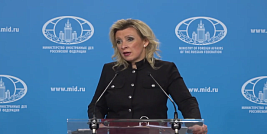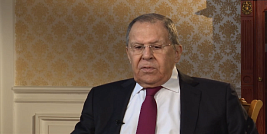Foreign Minister Sergey Lavrov’s statement and answer to a media question following a meeting of the foreign ministers of Russia and the Alliance of Sahel States, Moscow, April 3, 2025
Good afternoon, respected members of the media.
We have held the first meeting in the new Russia-Alliance of Sahel States format with our friends from Mali, Burkina Faso and Niger. I would like to once again welcome our friends from this young but dynamically developing association, which was established less than a year ago, to Moscow.
We regard the establishment of the Alliance as proof of the three Sahel states’ commitment to building a new regional security architecture and conducting an independent foreign policy with reliance on their national interests and potential. The Alliance of Sahel States is a bright evidence of Africa’s second revival and the Africans’ striving to play an active and independent role in global affairs and to shake off the remains of their colonial dependence.
I would like to point out that we will continue to provide all-round support to the strengthening of the continent’s positions and will promote a more just multipolar world order where the African continent and its integration structures hold a befitting place.
It is gratifying to feel the general mood for strengthening our partnership based on mutual trust, respect and mutual advantage. I emphasised Russia’s readiness to provide all-round assistance to the Alliance in the three priority areas of its operation, namely, defence and security, the economy, and diplomacy in the sense of participation in international processes.
The Sahel-Sahara Region has come against manifestations of terrorism. We have pointed out that its roots largely go back into its colonial past. For example, we know from history that the parent states marked borders in Africa without any regard for the people who live on these territories, actually cutting through peoples and ethnic groups and forcing them to live in different states. This legacy continues to exert its negative influence to this day.
Some non-regional players have not abandoned their attempts to destabilise the region. The group of former colonial powers has recently been joined by the Kiev regime, which is openly supporting terrorist groups in that part of Africa with the connivance of its Western sponsors.
For our part, I have emphasised Moscow’s readiness to provide all-round assistance to strengthening the potential of the united armed forces of the Alliance of Sahel States, enhancing the combat ability of each of the three countries’ national armed forces, and training military and law enforcement personnel for them.
We continue to render comprehensive assistance to countries forming the Alliance of Sahel States in other areas as well. We regularly supply farm products, fertilisers, energy and other critically important products. We are well aware of the importance of these supplies, at this stage, primarily food, for the socioeconomic development of African states.
The volume of mutual trade has increased more than ten-fold within a year. But there is no reason to rest on our oars. The absolute figures are quite modest and incommensurate with the existing potential. We had a detailed discussion on this point earlier today. To strengthen the material foundation of our cooperation, we have agreed to take additional specific steps (they are being drafted) to implement joint promising economic projects both within the framework of Russia’s bilateral relations with each of the three countries and in the context of the four-party format, given the emergence of interesting and effective integration mechanisms within the Alliance.
We have considered from concurrent positions some present-day regional and global issues. We are united by our commitment to the fundamental principles of international law, such as sovereign equality of states, non-interference in internal affairs, and respect for the right of peoples to determine their own destiny and models of political and socioeconomic development. And we are certainly united by respect for yet another crucial principle of the UN Charter, which concerns observance of human rights regardless of race, gender, language or religion.
We categorically opposed the attempts to politicise human rights issues, which is something our Western colleagues constantly engage in at the UN agencies. They tend to politicise things when all they need to do is push for ensuring the specific people’s rights that are violated everywhere, including, more recently, in Europe.
On a separate note, we touched upon Mali, Burkina Faso and Niger exiting from the Economic Community of West African States and discussed the principles underlying the two associations’ coexistence. Russia is prepared to assist in establishing an equal and constructive dialogue to this end. We will be happy to provide our services whenever they may be needed.
We agree that the Russia-Alliance of Sahel States dialogue will give an extra boost to advancing bilateral relations and creating quadripartite cooperation mechanisms. All of the above will help promote comprehensive cooperation and interaction within the Russia-Africa Partnership Forum at the level of foreign ministers. Preparations for holding its second meeting are underway.
On a final note, I would like to say that, as my friend Minister of Foreign Affairs and International Cooperation of the Republic of Mali Abdoulaye Diop informed me, this is the first time the flag of the Alliance of Sahel States has been displayed outside the region. If you look at it you will see that is has an image of a baobab tree on it. In West African tradition, baobab is the tree of reconciliation. This symbol reflects the aspirations of our peoples; there is no doubt about it. I would like to wish the peoples and, more generally, your countries, peaceful life, well-being, prosperity, and every success for the Alliance.
It has earned credibility and a positive reputation. Other countries are interested in participating in the Alliance of Sahel States. I think that its role in promoting nationally oriented programmes in Africa will continue to grow stronger. Russia will be pleased to assist these efforts.
We have adopted a communiqué following this meeting. It will be circulated. It lays out our agreement to make these quadripartite meetings regular and to meet annually in Russia and in a country of the Alliance of Sahel States on a rotational basis.
Question (retranslated from French): What decisions were taken following today’s meeting in order to strengthen the new Russia-Alliance of Sahel States partnership, including in diplomacy, defence and development?
Sergey Lavrov: We have approved the communiqué, and it will be circulated shortly. It focuses on defence and security matters in the context of ensuring independence, sovereignty and territorial integrity of the three countries that have formed the Alliance of Sahel States.
The Joint Forces of the Alliance are in the process of being created. Russia confirmed today that it is prepared to, in addition to cooperation on strengthening the defence capabilities of the three countries through bilateral channels, assist in formation of the Joint Forces of the Alliance of Sahel States by providing advisory services. We have such experience with our neighbours, primarily, the Republic of Belarus, and the CSTO member states. I’m convinced that this experience can be used to form the United Armed Forces of the Alliance of Sahel States.
We will transfer this experience by setting up special courses led by our instructors, who are already working in large numbers in the countries represented here. Military product supplies are another indispensable step if you want to create the tripartite armed forces.
Our specialists can help develop a plan for equipping these armed forces with specific types of weapons and equipment. We have quite specific agreements to build on what has been and is being done bilaterally. Now, the quadripartite format will further strengthen our ties in the military-technical sphere.
With regard to diplomacy, today we confirmed our overlapping positions on all fundamental international matters. We are coordinating our steps at the UN. The friendly countries represented here are supportive of all our initiatives and co-sponsored many of them as part of the UN General Assembly. We reciprocate and support the just aspirations of the leadership of Mali, Burkina Faso and Niger. They seek respect for the national interests of their countries and respect for their independence and autonomy. We support this in more ways than just morally and politically. When attempts are made at the UN Security Council to push through decisions that are at odds with the Alliance of Sahel States’ interests, the Russian Federation does not let these decisions go through.
I can talk at length about specific areas of our cooperation at the UN. We certainly share our approaches when it comes to elections to various bodies. The United Nations does not always support candidates put forward by one of our countries.
Read more about this in the communiqué that we agreed upon today and which reflects our commitment to continuing to work in this format.
